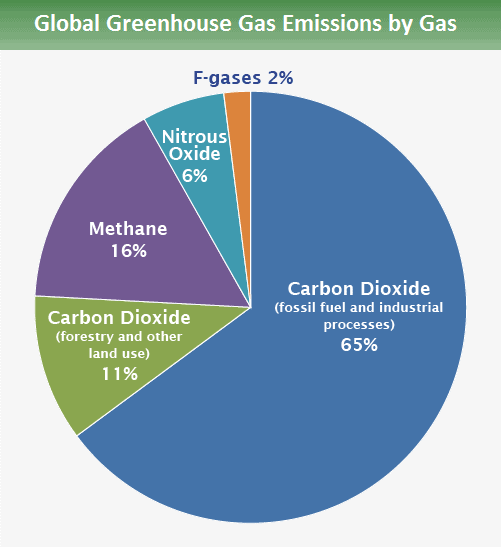The popularity of natural gas continues to increase as it has a number of excellent qualities that make it better than other types of fossil fuel. However, a question that’s continuously being asked is whether natural gas is a source of clean energy. I’ll be answering this question in this article and more.
Natural gas is generally considered clean energy as it burns efficiently and emits fewer air pollutants when compared to the burning of petroleum products or coal. On the other hand, its comprised of methane which is a greenhouse gas, and burning natural gas creates carbon dioxide.
About 117 pounds of carbon dioxide (CO2) will be emitted per million British thermal units (MMBtu) equivalent of natural gas. This is far lower when compared to the more than 200 pounds of CO2 that will be emitted per MMBtu of coal or the more than 160 pounds of CO2 produced per MMBtu of distillate fuel oil.
Burning natural gas for fuel seems like the ideal solution to cleaning up the environment and helping the climate, but it is not as clear cut as it seems. Extracting natural gas is not environmentally friendly and the newer method of fracking has its own sets of problems.
Is Natural Gas Better than Oil and Coal ?
From the previous paragraphs, you know that natural gas is considered to be a cleaner energy source because it is environmentally friendly and emits fewer pollutants than other types of fossil fuels. This means chemicals responsible for acid rain, greenhouse gases, smog, and other harmful sources of pollution are released in smaller quantities.
Natural gas burns efficiently, very efficiently. About 90% of natural gas is converted to useful energy after combustion. This is a lot higher than you would get from other types of fossil fuels.
Let’s take a look at the benefits of natural gas.
Environmental benefits of natural gas
Natural given chemical advantages
The main benefit of natural gas lies in the fact that it is natural. Natural gas consists of mainly methane which is converted to water vapor and CO2 on combustion. The amount of CO2 produced by the combustion of natural gas is lower than that of other types of fossil fuel as shown above. And the lower the quantity of populace released into the atmosphere, the better for our environment.
Natural gas Is not toxic
Natural gas is not toxic because it has no smell or color. And should natural gas leak, there will be fewer adverse effects on plants and wildlife compared to other types of fossil fuel. Try comparing this to oil spills from shipping that have a devastating effect on the environment and could potentially lead to large costs.
The only time a natural gas leak could affect the quality of oxygen available is in an enclosed space. Otherwise, the natural gas will join the many gases in the ever-constant moving atmosphere and cause no problems.
Overall, natural gas is considered to be very safe and that’s why it’s being used in many homes across the world. And with many modern and advanced equipment available currently, natural gas leaks should not occur.
Liquified Natural Gas (LNG)
When natural gas is cooled to about -162°c (-260°F), it becomes a liquid and will be referred to as Liquified Natural Gas (LNG). A massive reduction in volume (by about 6000%) takes place when natural gas becomes liquefied.
This makes it extremely easy to transport natural gas and also store the gas in vacuum insulated tanks on ships, containers, and trucks. This provides a more flexible and storage-friendly solution for liquefied natural gas than that of pipeline gas resulting in the increased safety pg the environment.
Less risk with Natural Gas
The risk of ignition as far as natural gas is concerned is low. This is because natural gas needs very specific conditions i.e a very specific gas/air ratio to become flammable. The gas/air ratio has to be about 5-15%. If the natural gas in the air isn’t up to 5%, the mixture will not burn as it will be too thin.
Also, if the amount of natural gas in the mix is more than 15%, it will not burn because the mix will be too heavy or too rich. There is also the fact that the ignition temperature for natural gas is 540°c or 1004°F.
In the case of LNG, there will be no ignition if there is an LNG leak as long as the temperature doesn’t exceed 100 °C (212 °F). The LNG will instead go back to the gaseous state and combine with air to form a non-flammable mixture.
Other benefits of natural include the fact the gas is extremely reliable and cheap. Also, the supply of natural gas is plentiful which will help reduce dependence on other fossil fuels.
The Drawbacks to Using Natural Gas
Using natural gas as a fuel creates carbon dioxide and some other pollutants considered bad for the climate. I won’t go into the controversy with climate change in this article but based on the numbers and data do believe that we need to start decarbonizing society quickly. Natural gas is a major contributor, and even though it is cleaner than other fuel sources, its use should be reduced.

One of my favorite climate researchers is Dr. James Hansen because he backs up his claims on climate change with data that is hard to dispute. His main claim is that we need to keep the total carbon released into the environment below 500 GT of carbon to prevent going over the 2 to 3 C temperature rise that many say is the point of no return. (Link to his research here)
Fracking is another drawback from natural gas extraction. There are a number of problems with fracking. We all know about the flammable drinking water coming out of the tap some places.
Fracking is exempt from complying with the Safe Drinking Water Act. The companies are also not required to share the ingredients of the fracking chemicals they inject into the earth to assist the process. I have to get special permission just to store bleach for cleaning at work in the correct cabinet or face fines. Fracking is exempt from disclosure.
There is an estimated 500,000 to a million fracking wells in the United States with each well using about 16 million gallons of freshwater. If you do the math, you’ll realize that fracking consumes about 1% of the freshwater used annually. The wastewater has all the unknown chemicals in it as well as heavy metals and radium. There is complete silence in the media about this massive amount of pollution.
The last bit of information to take into consideration is the fact that there is only an estimated 50 years of natural gas left to be extracted, shortly after running out of oil(link to article here), and 50 years before running out of coal. Oil industry consultants have a longer timeline on when we will run out but miss the whole point.
We need to be better stewards of earth for our children and grandkids. When do I tell my 4 year old that she won’t have any oil left by the time she is 60? What is my excuse going to be? We can use our resources now but need to be very proactive about transitioning to renewable resources.
The Future of Natural Gas
Natural gas popularity continues to grow due to the several environmental benefits it offers. After all, humanity is after cleaner energy houses that will have less adverse effects on the environment. However, replacing other fossil fuels with natural gas would not be an effective long-term climate strategy. Still, the several benefits of natural gas make it useful in the near- to medium-term.
The affordable costs of natural gas is a boon to its adoption as electricity generation from other fossil fuels have significantly shifted to natural gas over the last couple of years. Burning natural gas under sufficient regulatory oversight has immediate benefits in improving public health as well as environmental benefits due to the significant reduction in air pollution.
The fact that natural gas generators can easily and quickly be ramped up and down allows them to support the integration of solar and wind, providing even more flexibility to the electricity system. Natural gas has also been invaluable in meeting peak electricity demand and also powering cogeneration plants that are responsible for the generation of heat and power.
Despite all the obvious benefits of natural gas, it is by no means a definitive solution to the several environmental problems that are caused by our energy use. Despite the fact that natural gas produces fewer air pollutants than other types of fossil fuels, it’s still has a number of negative impacts on the environment.
One of such impacts occurs during the drilling and extraction of natural gas from wells as well as transportation which results in the release of methane. Methane is the main constituent of natural gas and is 34 times stronger than CO2 at trapping heat over a 100-year period and 86 times stronger over 20 years.
Natural gas burning may be cleaner than other fossil fuels but it is not without pollutants. Nitrogen oxides (NOx) are one of the products of natural gas combustion although the amount produced is still lower than that of other fossil fuels. NOx are precursors for fog and could affect local and regional air quality. The air quality in drilling areas is usually poor. ‘
The drilling and exploration of natural gas may affect vegetation and wildlife as the environment around the gas well may need to be cleared and leveled and water pollution could also occur,
Climate scientists agree that the planet will need about an 80% reduction in carbon emissions if we are to avert the worst effects of climate change. And switching to natural gas isn’t going to make that happen, In fact, a natural gas centered world would still have significant environmental and public health risks.
The solution to the environmental problems caused by our energy use will first be a diversified energy system where more emphasis is placed on renewable energy and energy efficiency. Natural would take a modest role and a crucial transition to a world totally powered by renewable energy would be ideal.

